Leviticus 5 meaning explained in AI Summary
The Guilt Offering for Violations
- Restitution and Atonement: This chapter describes the guilt offering, required for specific offenses or violations, such as deceiving a neighbor or touching something unclean. It served a two-fold purpose: restitution and atonement.
- Repaying the Wronged Party: The offender was required to repay the wronged party for any damages caused, along with an additional penalty of 20% as an offering to the Lord. This emphasized the importance of restoring what was taken.
- Animal Sacrifice for Atonement: In addition to restitution, a guilt offering of a specific animal was required to make atonement for the sin committed. This act acknowledged God's holiness and the need for forgiveness.
Leviticus 5 outlines the procedures for atonement for unintentional sins, emphasizing that even unintentional transgressions require reconciliation with God.
of the chapter:
1. Sins of Omission (Verses 1-4):
- Failing to testify: If someone witnesses a crime or hears a vow sworn falsely and doesn't come forward, they are guilty and must bring a guilt offering.
- Touching unclean things: Unintentional contact with things rendered unclean (like a carcass or bodily discharge) requires a guilt offering.
2. Sins of Commission (Verses 5-13):
- Swearing falsely: If someone makes a rash oath, even unintentionally, they must confess and offer a guilt offering.
- Unintentional sins: This section covers a broad range of unintentional sins, highlighting that even if someone doesn't realize they've sinned, they are still responsible. The offering varies depending on their ability to afford a lamb, goat, birds, or flour.
3. Sins against the Lord's Holy Things (Verses 14-19):
- Unintentional misuse of dedicated things: If someone unknowingly benefits from something dedicated to the Lord, they must make restitution with an added fifth of the value and offer a ram as a guilt offering.
Key Themes:
- Holiness of God: Even unintentional sins are offenses against God's holiness and require atonement.
- Justice and Mercy: God's justice demands accountability for sin, but His mercy provides a way to make things right through offerings.
- Accessibility of Atonement: The offerings are tiered based on economic status, ensuring everyone has access to atonement.
Overall, Leviticus 5 underscores the importance of taking responsibility for all our actions, even unintentional ones, and seeking reconciliation with God through the prescribed offerings.
Leviticus 5 bible study ai commentary
Leviticus 5 introduces the Guilt Offering (Hebrew: 'asham), a specific sacrifice required for unintentional sins that are not immediately obvious or involve a breach of trust/sacrilege. This chapter focuses on sins of omission, carelessness, and violations against sanctified things. The offering addresses situations where an individual becomes aware of their guilt after the fact. It uniquely emphasizes confession, the principle of restitution, and God's gracious provision for the poor through a "sliding scale" of sacrifices, ensuring atonement is accessible to all.
Leviticus 5 Context
The laws in Leviticus were given to Israel at Mount Sinai. Their purpose was to establish a protocol for how an unholy people could live in the presence of a holy God, who dwelled in the Tabernacle at the center of their camp. These rituals were not to appease an angry deity, but to maintain covenant purity, provide a means of atonement for sin and defilement, and distinguish Israel from its Ancient Near Eastern neighbors, whose religious practices were often based on magic, appeasement of capricious gods, or earning divine favor. The Guilt Offering, in particular, provided a way to restore relationships—both with God (in cases of sacrilege) and the community (in cases like withholding testimony)—that had been damaged by unwitting sin.
Leviticus 5:1
"‘If anyone sins in that he hears a public adjuration to testify, and though he is a witness, whether he has seen or come to know the matter, yet does not speak, he shall bear his iniquity;"
In-depth-analysis
- This verse addresses a sin of omission: withholding evidence in a legal proceeding. Silence, in this case, is a sin.
- Public Adjuration: The Hebrew 'alah refers to an oath or a curse invoked in public. To hear this and remain silent was to become complicit and fall under the curse.
- He shall bear his iniquity: This is a legal and spiritual declaration. The individual carries the liability and consequences for their sin until atonement is made. It disrupts their fellowship with God.
- The sin is against the community's pursuit of justice and, by extension, against God's law.
Bible references
- Proverbs 29:24: "Whoever is partner with a thief hates his own life; he hears the curse and discloses nothing." (Direct parallel of the sin of withholding testimony).
- Matthew 26:63: "But Jesus remained silent. And the high priest said to him, 'I adjure you by the living God, tell us if you are the Christ, the Son of God.'" (Jesus, put under this exact type of oath, then speaks, fulfilling the obligation to testify).
Cross references
Judg 17:2 (oath for stolen silver), 1 Kgs 8:31 (oath before the altar), Num 30:2 (binding nature of oaths).
Leviticus 5:2
"or if anyone touches any unclean thing, whether a carcass of an unclean beast or a carcass of unclean livestock or a carcass of unclean swarming things, and it is hidden from him and he has become unclean, and he realizes his guilt;"
In-depth-analysis
- This deals with unintentional ritual defilement, not necessarily moral sin. The uncleanness comes from contact with death, which is antithetical to the living God.
- It is hidden from him: The key element is inadvertence. The person did not know they had become unclean.
- Realizes his guilt: The sin requiring atonement is not the initial, accidental contact, but remaining in a state of defilement once it's known, especially if one were to approach the sanctuary. Awareness brings accountability.
Bible references
- Numbers 19:13: "Whoever touches the dead body of any person and does not cleanse himself, defiles the tabernacle of the LORD..." (Explains the consequence of unaddressed defilement).
- Haggai 2:13: "If someone who is unclean by contact with a dead body touches any of these, does it become unclean?’ The priests answered and said, ‘It does become unclean.’" (Prophetic application of this principle to the nation).
- Acts 10:14-15: "But Peter said, 'By no means, Lord; for I have never eaten anything that is common or unclean.' ...'What God has made clean, do not call common.'" (Fulfillment in Christ, who renders the ritual laws obsolete).
Cross references
Lev 11 (laws of clean and unclean animals), Lev 7:21 (consequence of touching uncleanness), Lev 22:3-6 (priests and uncleanness).
Leviticus 5:3
"or if he touches human uncleanness, of whatever sort the uncleanness may be with which one becomes unclean, and it is hidden from him, when he comes to know it, and realizes his guilt;"
In-depth-analysis
- This is a parallel to verse 2, extending the principle from unclean animals to various forms of human ritual impurity.
- Human Uncleanness: This could refer to bodily discharges (Lev 15), skin diseases (Lev 13-14), or contact with a human corpse (Num 19).
- The structure is identical: inadvertent contact -> becomes hidden -> subsequent realization -> objective guilt that must be atoned for.
Bible references
- Leviticus 15:31: "Thus you shall keep the people of Israel separate from their uncleanness, lest they die in their uncleanness by defiling my tabernacle that is in their midst." (States the purpose behind these laws).
- Mark 5:25-27: "And there was a woman who had had a discharge of blood for twelve years... She had heard the reports about Jesus and came up behind him in the crowd and touched his garment." (This woman was in a constant state of ritual uncleanness as described here, yet by faith touches the holy one and is made clean, not Him unclean).
Cross references
Lev 12-15 (laws of human uncleanness), Num 19:11-22 (uncleanness from a corpse).
Leviticus 5:4
"or if anyone swears, speaking rashly with his lips to do evil or to do good, in any sort of matter that a man may speak rashly with an oath, and it is hidden from him, when he comes to know it, and he realizes his guilt in any of these;"
In-depth-analysis
- This verse concerns sins of the tongue—specifically, a rash or thoughtless vow.
- Speaking Rashly (bivtah): This highlights the impulsive, unthinking nature of the oath.
- To do evil or to do good: The vow is binding regardless of its intent. This covers both promising something harmful (which shouldn't be kept) and promising something beneficial (which one might forget or be unable to keep).
- The sin lies in the careless use of God's name or one's word, and the subsequent failure to follow through.
Bible references
- Judges 11:30-35: "...Jephthah made a vow to the LORD... And the LORD gave them into his hand... he did with her according to his vow that he had made." (The most tragic biblical example of a rash vow).
- Matthew 5:34, 37: "But I say to you, Do not take an oath at all... Let what you say be simply ‘Yes’ or ‘No’; anything more than this comes from evil." (Jesus addresses the root cause of rash vows and elevates the standard to complete truthfulness).
Cross references
Num 30:2 (law on vows), Ecc 5:4-6 (warning against rash vows), Ps 15:4 (who swears to his own hurt and does not change).
Leviticus 5:5-6
"when he realizes his guilt in any of these and confesses the sin he has committed, he shall bring to the LORD as his compensation for the sin that he has committed a female from the flock, a lamb or a goat, for a sin offering. And the priest shall make atonement for him for his sin."
In-depth-analysis
- This section prescribes the two required actions for the previous four sins: confession and sacrifice.
- Confesses the sin: This is a crucial, non-negotiable step. Atonement is not a mechanical ritual; it requires acknowledging the specific wrongdoing. It's the verbal admission of guilt.
- Compensation...a sin offering: The offering is called an 'asham (guilt/reparation offering) but is brought here "for a sin offering" (l'hatta't). This shows the overlapping function: it purges the defilement of sin (hatta't) while also repairing the breach of guilt ('asham).
Bible references
- 1 John 1:9: "If we confess our sins, he is faithful and just to forgive us our sins and to cleanse us from all unrighteousness." (The New Covenant fulfillment of the principle of confession leading to forgiveness and cleansing).
- Proverbs 28:13: "Whoever conceals his transgressions will not prosper, but he who confesses and forsakes them will obtain mercy." (The wisdom tradition's affirmation of confession).
- Numbers 5:7: "...he shall confess his sin that he has committed. And he shall make full restitution for his wrong..." (Links confession with restitution).
Cross references
Ezra 10:1 (public confession), Neh 1:6 (confession for the nation), Dan 9:4 (Daniel's prayer of confession).
Leviticus 5:7-10
"‘But if he cannot afford a lamb, then he shall bring to the LORD as his compensation for the sin that he has committed two turtledoves or two pigeons, one for a sin offering and the other for a burnt offering. ... and wring off its head ... The rest of the blood shall be drained out at the base of the altar; it is a sin offering. Then he shall offer the second for a burnt offering according to the rule."
In-depth-analysis
- This introduces God's gracious "sliding scale" for the poor. Atonement is not limited by economic status.
- Two birds serve two functions:
- Sin Offering: The blood is sprinkled on the side of the altar, purifying from sin's defilement.
- Burnt Offering: The whole bird is offered up, signifying complete consecration and dedication to God. This restored relationship requires rededication.
- The detailed procedure shows that even the smallest offering had to be treated with utmost seriousness and according to God's precise commands.
Bible references
- Luke 2:22-24: "...they brought him up to Jerusalem to present him to the Lord ...and to offer a sacrifice according to what is said in the Law of the Lord, 'a pair of turtledoves, or two young pigeons.'" (Mary and Joseph were poor and availed themselves of this very provision).
- 2 Corinthians 8:9: "For you know the grace of our Lord Jesus Christ, that though he was rich, yet for your sake he became poor, so that you by his poverty might become rich." (The ultimate theological principle of divine condescension to provide for the poor).
Cross references
Lev 1:14-17 (procedure for bird burnt offerings), Lev 12:8 (same provision after childbirth).
Leviticus 5:11-13
"‘But if he cannot afford two turtledoves or two pigeons, then he shall bring as his offering for the sin that he has committed a tenth of an ephah of fine flour for a sin offering. He shall put no oil on it and lay no frankincense on it, for it is a sin offering... And the priest shall make atonement for him...and he shall be forgiven.’"
In-depth-analysis
- This is the final tier of the sliding scale, for the poorest individuals.
- Flour, not an animal: This is a notable exception to the principle "without the shedding of blood there is no forgiveness" (Heb 9:22). However, it does not contradict it. The flour derives its atoning power from its application on the altar at the center of the blood-based sacrificial system. It functions as a token connected to the whole system.
- No Oil or Frankincense: Oil symbolized joy or the Spirit's anointing, and frankincense symbolized the sweetness of prayer. Their absence signifies the solemn, grievous nature of sin. This is a stark memorial of wrongdoing, not a celebration.
- The final phrase, "he shall be forgiven," is the definitive declaration of grace. God's purpose is restoration.
Bible references
- Hebrews 9:22: "Indeed, under the law almost everything is purified with blood, and without the shedding of blood there is no forgiveness of sins." (The general principle to which this flour offering is a gracious, limited exception).
- Micah 6:6-7: "With what shall I come before the LORD...? Shall I come before him with burnt offerings...? Will the LORD be pleased with thousands of rams...?" (The prophetic critique that true repentance, not just the value of the sacrifice, is what God desires).
Cross references
Lev 2:1 (grain offerings, which do have oil and frankincense), Lev 6:15 (the priest's portion), Num 28:5 (flour as part of regular offerings).
Polemics
Some scholars have argued this verse proves blood is not necessary for atonement. However, the majority view within a biblical theology framework is that this offering is an exception rooted in grace, not a change in principle. Its value is derived from the altar itself, which is constantly sanctified by blood from the daily, weekly, and annual sacrifices. The flour is "baptized" into the blood-based system.
Leviticus 5:14-16
"The LORD spoke to Moses, saying, ‘If anyone commits a breach of faith and sins unintentionally in any of the holy things of the LORD, he shall bring to the LORD as his compensation a ram without blemish out of the flock, valued in silver shekels, according to the shekel of the sanctuary, for a guilt offering. He shall also make restitution for the harm he has done in the holy thing and shall add a fifth to it and give it to the priest. And the priest shall make atonement for him... and he shall be forgiven."
In-depth-analysis
- This section shifts to a second category of guilt offering, one requiring restitution. The sin is a sacrilege against God's property.
- Breach of Faith (ma'al): A strong term for treachery or misappropriation.
- Holy Things: This refers to tithes, offerings, or portions of sacrifices that were consecrated to God or the priests. Unintentionally withholding or misusing them was a direct offense against God.
- Restitution plus 20%: The sinner must not only bring a valuable ram but also restore the original value of what was misused plus a one-fifth (20%) penalty. This repaired the material and spiritual damage. Atonement here is both sacrificial and financial.
Bible references
- Luke 19:8: "And Zacchaeus stood and said to the Lord, 'Behold, Lord, the half of my goods I give to the poor. And if I have defrauded anyone of anything, I restore it fourfold.'" (A demonstration of true repentance going far beyond the 20% requirement).
- Numbers 5:7-8: "...he shall confess his sin ... And he shall make full restitution for his wrong, adding a fifth to it..." (The parallel law for making restitution for wrongs committed against a human neighbor).
Cross references
Lev 6:1-7 (guilt offering for defrauding a neighbor), Lev 22:14 (penalty for eating a holy offering unintentionally), Mal 3:8 (robbing God in tithes and offerings).
Leviticus 5:17-19
"‘If anyone sins, doing any of the things that by the LORD's commandments ought not to be done, though he did not know it, then he is guilty and shall bear his iniquity. He shall bring to the priest a ram without blemish out of the flock...for a guilt offering. And the priest shall make atonement for him for the mistake that he made unintentionally, and he shall be forgiven. It is a guilt offering; he has indeed incurred guilt before the LORD."
In-depth-analysis
- This is the final, "catch-all" category of the guilt offering. It covers sins of which a person is entirely unaware.
- Though he did not know it: This establishes the principle of objective guilt. A law broken incurs guilt before God whether the person is subjectively aware of it or not. Sin has consequences beyond our consciousness.
- This law provided a way for someone with a troubled conscience—a feeling that something was wrong but without knowing what—to find peace and cleansing.
- He has indeed incurred guilt: The text emphatically closes by stating the reality of the guilt. Ignorance is not innocence, but God provides a remedy for it through grace.
Bible references
- Psalm 19:12: "Who can discern his errors? Declare me innocent from hidden faults." (The psalmist's prayerful recognition of the reality of unknown sins).
- Hebrews 9:7: "...he enters only once a year, and not without taking blood, which he offers for himself and for the unintentional sins of the people." (The High Priest on the Day of Atonement specifically atoned for this category of "hidden" or "ignorant" sins).
- Luke 23:34: "And Jesus said, 'Father, forgive them, for they know not what they do.'" (Christ's prayer acknowledges that ignorance does not remove culpability, but it can be a basis for seeking mercy).
Cross references
Lev 4:2, 13, 27 (the standard sin offering also deals with unintentional sins, but this 'asham specifically handles guilt).
Leviticus chapter 5 analysis
- Atonement and Consciousness: This chapter reveals that sin is an objective reality, not just a subjective feeling. One can be guilty even if unaware. The sacrificial system provided a comprehensive covering for known, unknown, intentional, and unintentional sins, all of which ultimately point to the all-encompassing work of Christ.
- Confession, Restitution, and Restoration: Unlike other offerings focused solely on purification (sin offering) or dedication (burnt offering), the guilt offering uniquely combines cleansing with the principles of verbal confession and, where applicable, financial restitution. This highlights that true repentance involves acknowledging wrong, making amends where possible, and being restored to fellowship.
- The Gospel of Grace for the Poor: The "sliding scale" (lamb -> birds -> flour) is a profound statement about the character of God. Access to His forgiveness and grace is not determined by wealth. The poorest person's flour, when brought in faith, was just as effective for atonement as the rich person's lamb. This prefigures the gospel, which is offered freely to all (Isa 55:1, Rom 3:22-24).
- Typology of Christ: Jesus is the ultimate Guilt Offering.
- Isaiah 53:10 says of the Suffering Servant, "when his soul makes an offering for guilt ('asham), he shall see his offspring."
- He made perfect restitution, paying the debt for our sins against God which we could never repay (Col 2:13-14).
- He covers all sins—the ones we know, the ones we've forgotten, and the ones we were never aware of (Ps 19:12, Heb 9:7).
Leviticus 5 summary
Leviticus 5 details the Guilt Offering ('asham), which atones for unintentional sins made known after the fact. It covers withholding testimony, accidental defilement, rash oaths, and misusing holy items. The chapter uniquely emphasizes mandatory confession and restitution (often with a 20% penalty). It powerfully demonstrates God's grace by providing a sliding scale of sacrifices—from a lamb to two birds to simple flour—ensuring that atonement is accessible to everyone, regardless of their poverty.
Leviticus 5 AI Image Audio and Video

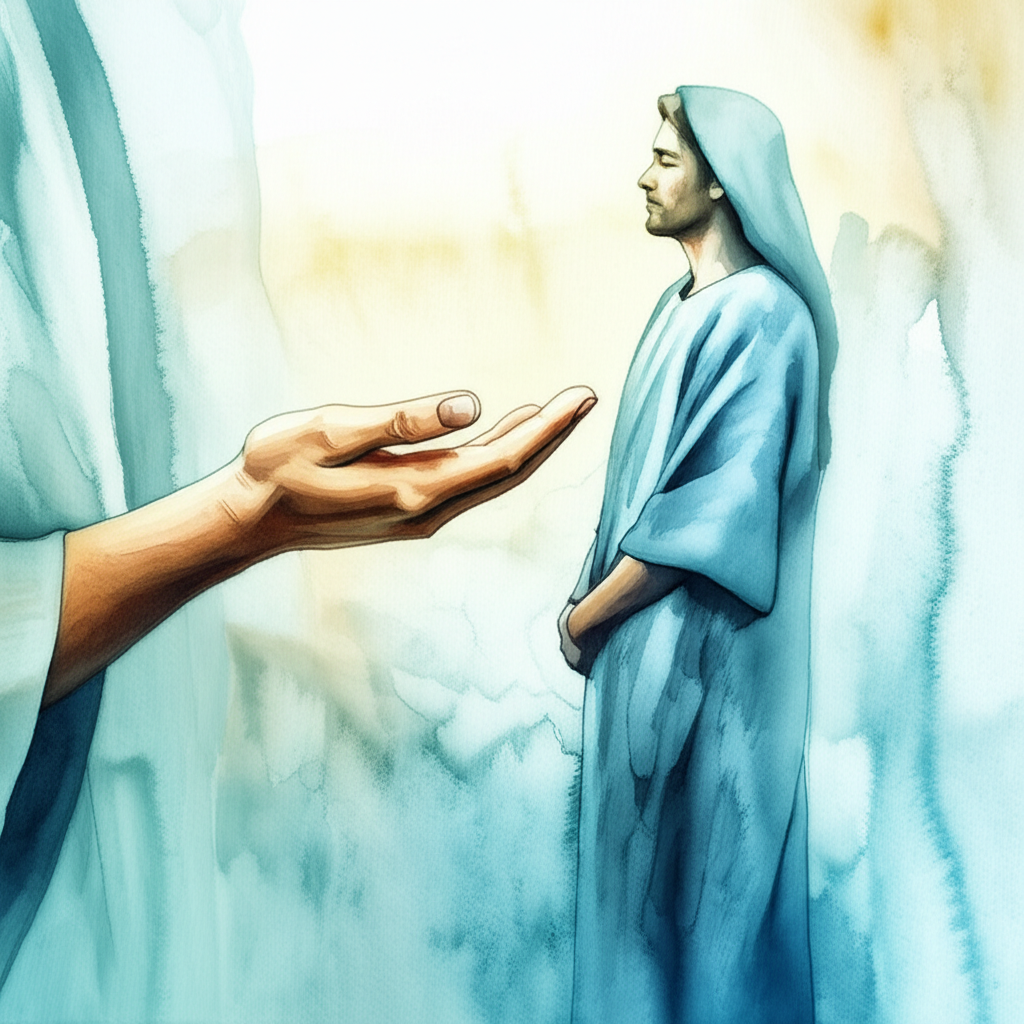

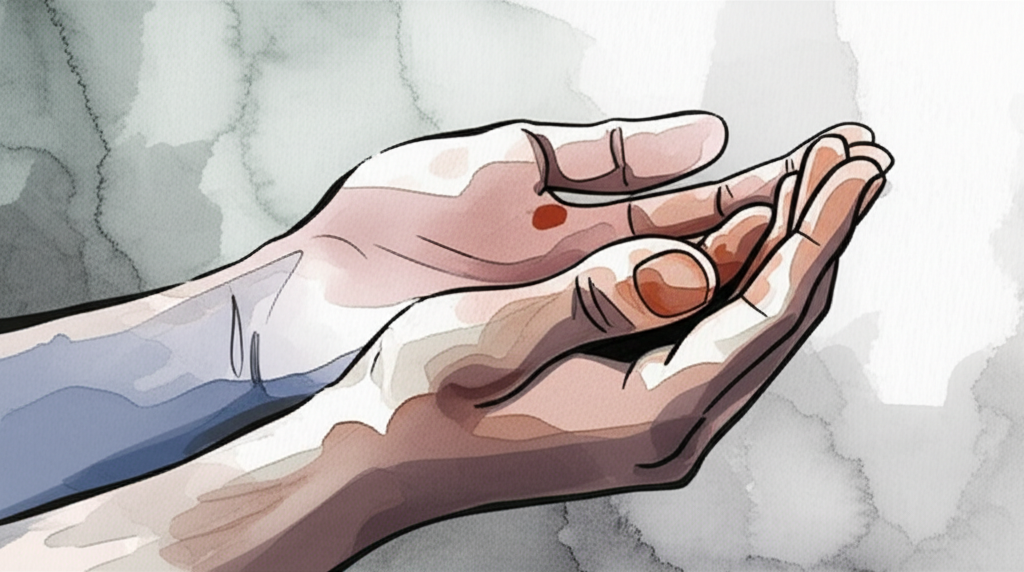
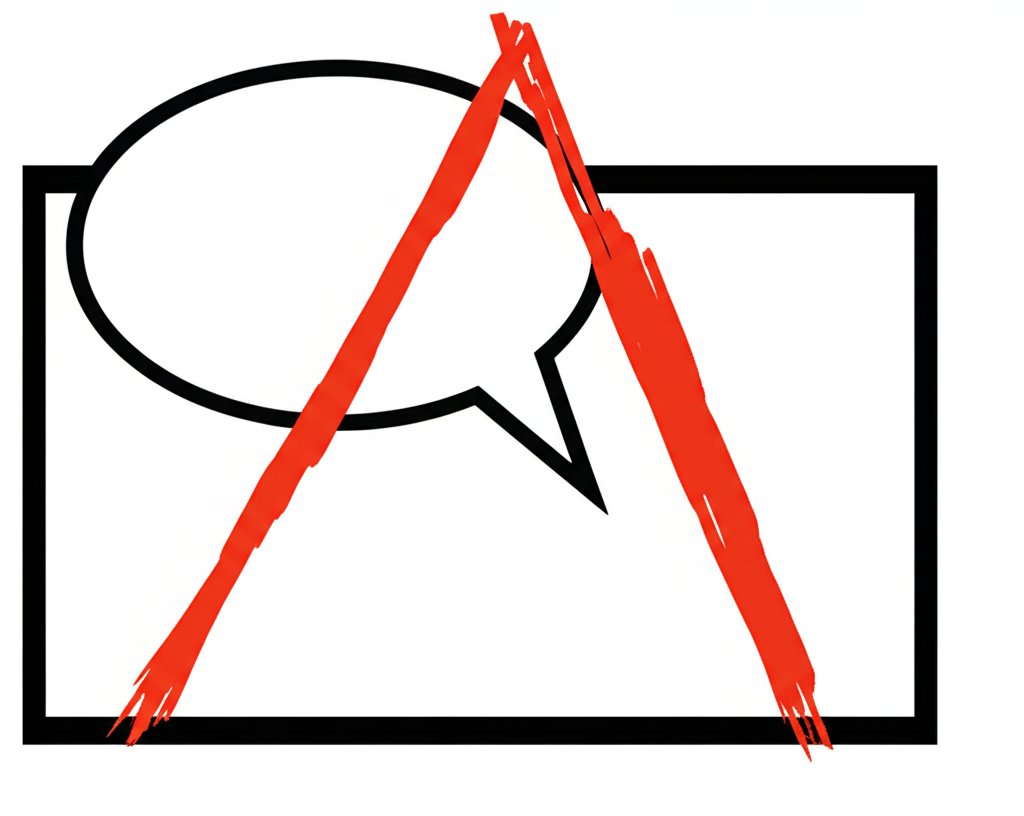
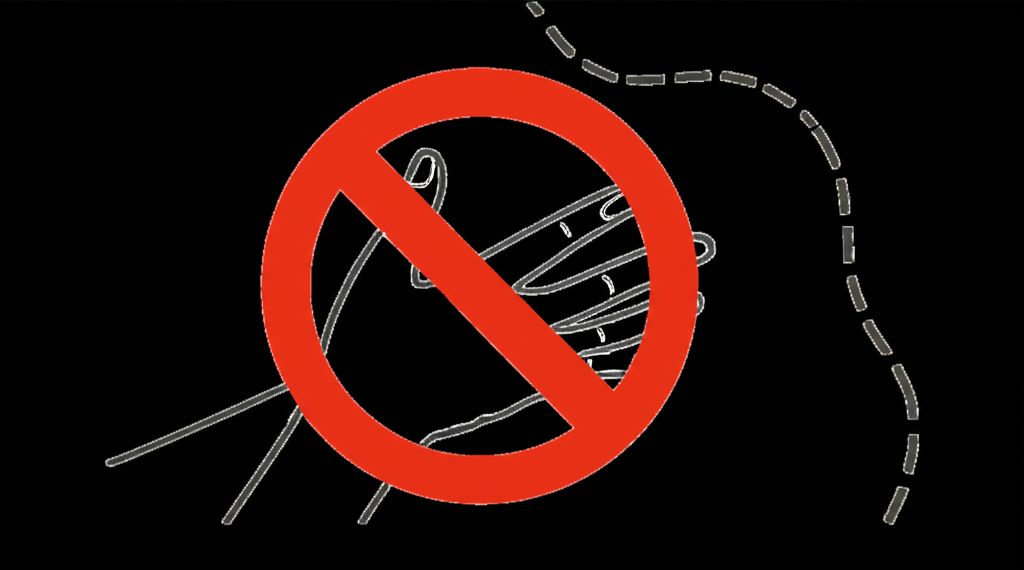
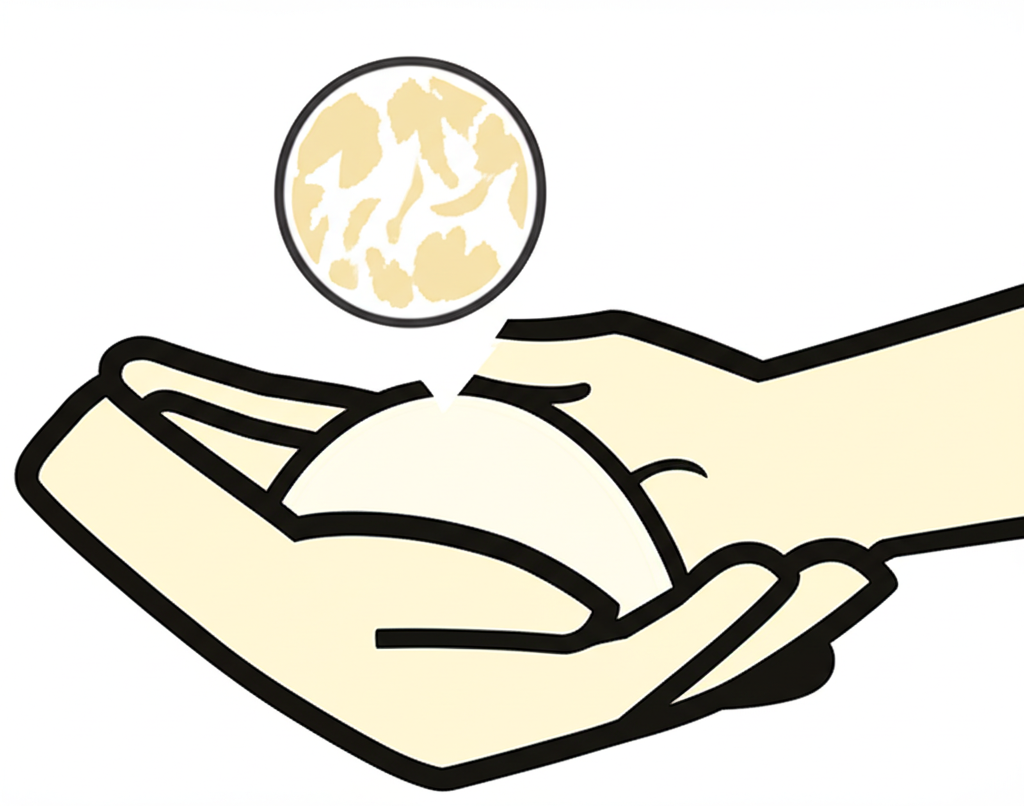
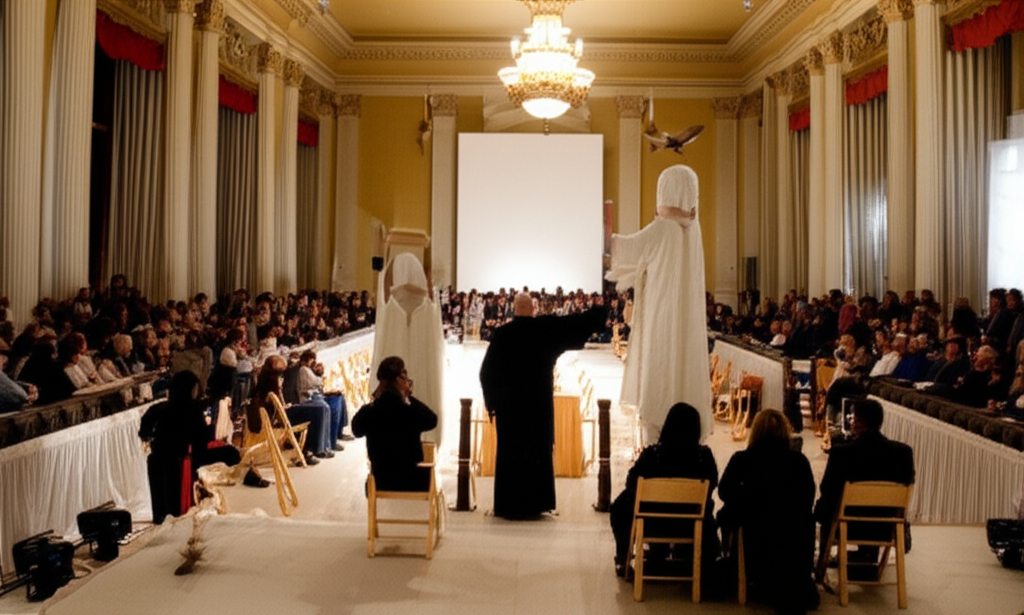
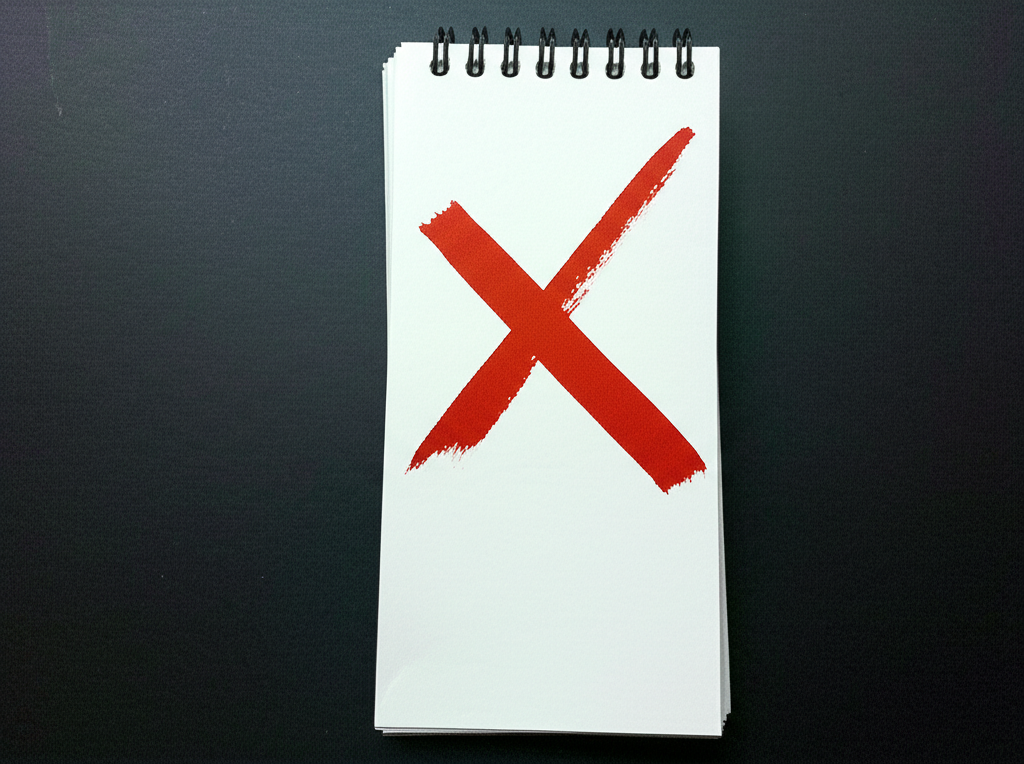

Leviticus chapter 5 kjv
- 1 And if a soul sin, and hear the voice of swearing, and is a witness, whether he hath seen or known of it; if he do not utter it, then he shall bear his iniquity.
- 2 Or if a soul touch any unclean thing, whether it be a carcass of an unclean beast, or a carcass of unclean cattle, or the carcass of unclean creeping things, and if it be hidden from him; he also shall be unclean, and guilty.
- 3 Or if he touch the uncleanness of man, whatsoever uncleanness it be that a man shall be defiled withal, and it be hid from him; when he knoweth of it, then he shall be guilty.
- 4 Or if a soul swear, pronouncing with his lips to do evil, or to do good, whatsoever it be that a man shall pronounce with an oath, and it be hid from him; when he knoweth of it, then he shall be guilty in one of these.
- 5 And it shall be, when he shall be guilty in one of these things, that he shall confess that he hath sinned in that thing:
- 6 And he shall bring his trespass offering unto the LORD for his sin which he hath sinned, a female from the flock, a lamb or a kid of the goats, for a sin offering; and the priest shall make an atonement for him concerning his sin.
- 7 And if he be not able to bring a lamb, then he shall bring for his trespass, which he hath committed, two turtledoves, or two young pigeons, unto the LORD; one for a sin offering, and the other for a burnt offering.
- 8 And he shall bring them unto the priest, who shall offer that which is for the sin offering first, and wring off his head from his neck, but shall not divide it asunder:
- 9 And he shall sprinkle of the blood of the sin offering upon the side of the altar; and the rest of the blood shall be wrung out at the bottom of the altar: it is a sin offering.
- 10 And he shall offer the second for a burnt offering, according to the manner: and the priest shall make an atonement for him for his sin which he hath sinned, and it shall be forgiven him.
- 11 But if he be not able to bring two turtledoves, or two young pigeons, then he that sinned shall bring for his offering the tenth part of an ephah of fine flour for a sin offering; he shall put no oil upon it, neither shall he put any frankincense thereon: for it is a sin offering.
- 12 Then shall he bring it to the priest, and the priest shall take his handful of it, even a memorial thereof, and burn it on the altar, according to the offerings made by fire unto the LORD: it is a sin offering.
- 13 And the priest shall make an atonement for him as touching his sin that he hath sinned in one of these, and it shall be forgiven him: and the remnant shall be the priest's, as a meat offering.
- 14 And the LORD spake unto Moses, saying,
- 15 If a soul commit a trespass, and sin through ignorance, in the holy things of the LORD; then he shall bring for his trespass unto the LORD a ram without blemish out of the flocks, with thy estimation by shekels of silver, after the shekel of the sanctuary, for a trespass offering.
- 16 And he shall make amends for the harm that he hath done in the holy thing, and shall add the fifth part thereto, and give it unto the priest: and the priest shall make an atonement for him with the ram of the trespass offering, and it shall be forgiven him.
- 17 And if a soul sin, and commit any of these things which are forbidden to be done by the commandments of the LORD; though he wist it not, yet is he guilty, and shall bear his iniquity.
- 18 And he shall bring a ram without blemish out of the flock, with thy estimation, for a trespass offering, unto the priest: and the priest shall make an atonement for him concerning his ignorance wherein he erred and wist it not, and it shall be forgiven him.
- 19 It is a trespass offering: he hath certainly trespassed against the LORD.
Leviticus chapter 5 nkjv
- 1 'If a person sins in hearing the utterance of an oath, and is a witness, whether he has seen or known of the matter?if he does not tell it, he bears guilt.
- 2 'Or if a person touches any unclean thing, whether it is the carcass of an unclean beast, or the carcass of unclean livestock, or the carcass of unclean creeping things, and he is unaware of it, he also shall be unclean and guilty.
- 3 Or if he touches human uncleanness?whatever uncleanness with which a man may be defiled, and he is unaware of it?when he realizes it, then he shall be guilty.
- 4 'Or if a person swears, speaking thoughtlessly with his lips to do evil or to do good, whatever it is that a man may pronounce by an oath, and he is unaware of it?when he realizes it, then he shall be guilty in any of these matters.
- 5 'And it shall be, when he is guilty in any of these matters, that he shall confess that he has sinned in that thing;
- 6 and he shall bring his trespass offering to the LORD for his sin which he has committed, a female from the flock, a lamb or a kid of the goats as a sin offering. So the priest shall make atonement for him concerning his sin.
- 7 'If he is not able to bring a lamb, then he shall bring to the LORD, for his trespass which he has committed, two turtledoves or two young pigeons: one as a sin offering and the other as a burnt offering.
- 8 And he shall bring them to the priest, who shall offer that which is for the sin offering first, and wring off its head from its neck, but shall not divide it completely.
- 9 Then he shall sprinkle some of the blood of the sin offering on the side of the altar, and the rest of the blood shall be drained out at the base of the altar. It is a sin offering.
- 10 And he shall offer the second as a burnt offering according to the prescribed manner. So the priest shall make atonement on his behalf for his sin which he has committed, and it shall be forgiven him.
- 11 'But if he is not able to bring two turtledoves or two young pigeons, then he who sinned shall bring for his offering one-tenth of an ephah of fine flour as a sin offering. He shall put no oil on it, nor shall he put frankincense on it, for it is a sin offering.
- 12 Then he shall bring it to the priest, and the priest shall take his handful of it as a memorial portion, and burn it on the altar according to the offerings made by fire to the LORD. It is a sin offering.
- 13 The priest shall make atonement for him, for his sin that he has committed in any of these matters; and it shall be forgiven him. The rest shall be the priest's as a grain offering.' "
- 14 Then the LORD spoke to Moses, saying:
- 15 "If a person commits a trespass, and sins unintentionally in regard to the holy things of the LORD, then he shall bring to the LORD as his trespass offering a ram without blemish from the flocks, with your valuation in shekels of silver according to the shekel of the sanctuary, as a trespass offering.
- 16 And he shall make restitution for the harm that he has done in regard to the holy thing, and shall add one-fifth to it and give it to the priest. So the priest shall make atonement for him with the ram of the trespass offering, and it shall be forgiven him.
- 17 "If a person sins, and commits any of these things which are forbidden to be done by the commandments of the LORD, though he does not know it, yet he is guilty and shall bear his iniquity.
- 18 And he shall bring to the priest a ram without blemish from the flock, with your valuation, as a trespass offering. So the priest shall make atonement for him regarding his ignorance in which he erred and did not know it, and it shall be forgiven him.
- 19 It is a trespass offering; he has certainly trespassed against the LORD."
Leviticus chapter 5 niv
- 1 "?'If anyone sins because they do not speak up when they hear a public charge to testify regarding something they have seen or learned about, they will be held responsible.
- 2 "?'If anyone becomes aware that they are guilty?if they unwittingly touch anything ceremonially unclean (whether the carcass of an unclean animal, wild or domestic, or of any unclean creature that moves along the ground) and they are unaware that they have become unclean, but then they come to realize their guilt;
- 3 or if they touch human uncleanness (anything that would make them unclean) even though they are unaware of it, but then they learn of it and realize their guilt;
- 4 or if anyone thoughtlessly takes an oath to do anything, whether good or evil (in any matter one might carelessly swear about) even though they are unaware of it, but then they learn of it and realize their guilt?
- 5 when anyone becomes aware that they are guilty in any of these matters, they must confess in what way they have sinned.
- 6 As a penalty for the sin they have committed, they must bring to the LORD a female lamb or goat from the flock as a sin offering; and the priest shall make atonement for them for their sin.
- 7 "?'Anyone who cannot afford a lamb is to bring two doves or two young pigeons to the LORD as a penalty for their sin?one for a sin offering and the other for a burnt offering.
- 8 They are to bring them to the priest, who shall first offer the one for the sin offering. He is to wring its head from its neck, not dividing it completely,
- 9 and is to splash some of the blood of the sin offering against the side of the altar; the rest of the blood must be drained out at the base of the altar. It is a sin offering.
- 10 The priest shall then offer the other as a burnt offering in the prescribed way and make atonement for them for the sin they have committed, and they will be forgiven.
- 11 "?'If, however, they cannot afford two doves or two young pigeons, they are to bring as an offering for their sin a tenth of an ephah of the finest flour for a sin offering. They must not put olive oil or incense on it, because it is a sin offering.
- 12 They are to bring it to the priest, who shall take a handful of it as a memorial portion and burn it on the altar on top of the food offerings presented to the LORD. It is a sin offering.
- 13 In this way the priest will make atonement for them for any of these sins they have committed, and they will be forgiven. The rest of the offering will belong to the priest, as in the case of the grain offering.'?"
- 14 The LORD said to Moses:
- 15 "When anyone is unfaithful to the LORD by sinning unintentionally in regard to any of the LORD's holy things, they are to bring to the LORD as a penalty a ram from the flock, one without defect and of the proper value in silver, according to the sanctuary shekel. It is a guilt offering.
- 16 They must make restitution for what they have failed to do in regard to the holy things, pay an additional penalty of a fifth of its value and give it all to the priest. The priest will make atonement for them with the ram as a guilt offering, and they will be forgiven.
- 17 "If anyone sins and does what is forbidden in any of the LORD's commands, even though they do not know it, they are guilty and will be held responsible.
- 18 They are to bring to the priest as a guilt offering a ram from the flock, one without defect and of the proper value. In this way the priest will make atonement for them for the wrong they have committed unintentionally, and they will be forgiven.
- 19 It is a guilt offering; they have been guilty of wrongdoing against the LORD."
Leviticus chapter 5 esv
- 1 "If anyone sins in that he hears a public adjuration to testify, and though he is a witness, whether he has seen or come to know the matter, yet does not speak, he shall bear his iniquity;
- 2 or if anyone touches an unclean thing, whether a carcass of an unclean wild animal or a carcass of unclean livestock or a carcass of unclean swarming things, and it is hidden from him and he has become unclean, and he realizes his guilt;
- 3 or if he touches human uncleanness, of whatever sort the uncleanness may be with which one becomes unclean, and it is hidden from him, when he comes to know it, and realizes his guilt;
- 4 or if anyone utters with his lips a rash oath to do evil or to do good, any sort of rash oath that people swear, and it is hidden from him, when he comes to know it, and he realizes his guilt in any of these;
- 5 when he realizes his guilt in any of these and confesses the sin he has committed,
- 6 he shall bring to the LORD as his compensation for the sin that he has committed, a female from the flock, a lamb or a goat, for a sin offering. And the priest shall make atonement for him for his sin.
- 7 "But if he cannot afford a lamb, then he shall bring to the LORD as his compensation for the sin that he has committed two turtledoves or two pigeons, one for a sin offering and the other for a burnt offering.
- 8 He shall bring them to the priest, who shall offer first the one for the sin offering. He shall wring its head from its neck but shall not sever it completely,
- 9 and he shall sprinkle some of the blood of the sin offering on the side of the altar, while the rest of the blood shall be drained out at the base of the altar; it is a sin offering.
- 10 Then he shall offer the second for a burnt offering according to the rule. And the priest shall make atonement for him for the sin that he has committed, and he shall be forgiven.
- 11 "But if he cannot afford two turtledoves or two pigeons, then he shall bring as his offering for the sin that he has committed a tenth of an ephah of fine flour for a sin offering. He shall put no oil on it and shall put no frankincense on it, for it is a sin offering.
- 12 And he shall bring it to the priest, and the priest shall take a handful of it as its memorial portion and burn this on the altar, on the LORD's food offerings; it is a sin offering.
- 13 Thus the priest shall make atonement for him for the sin which he has committed in any one of these things, and he shall be forgiven. And the remainder shall be for the priest, as in the grain offering."
- 14 The LORD spoke to Moses, saying,
- 15 "If anyone commits a breach of faith and sins unintentionally in any of the holy things of the LORD, he shall bring to the LORD as his compensation, a ram without blemish out of the flock, valued in silver shekels, according to the shekel of the sanctuary, for a guilt offering.
- 16 He shall also make restitution for what he has done amiss in the holy thing and shall add a fifth to it and give it to the priest. And the priest shall make atonement for him with the ram of the guilt offering, and he shall be forgiven.
- 17 "If anyone sins, doing any of the things that by the LORD's commandments ought not to be done, though he did not know it, then realizes his guilt, he shall bear his iniquity.
- 18 He shall bring to the priest a ram without blemish out of the flock, or its equivalent, for a guilt offering, and the priest shall make atonement for him for the mistake that he made unintentionally, and he shall be forgiven.
- 19 It is a guilt offering; he has indeed incurred guilt before the LORD."
Leviticus chapter 5 nlt
- 1 "If you are called to testify about something you have seen or that you know about, it is sinful to refuse to testify, and you will be punished for your sin.
- 2 "Or suppose you unknowingly touch something that is ceremonially unclean, such as the carcass of an unclean animal. When you realize what you have done, you must admit your defilement and your guilt. This is true whether it is a wild animal, a domestic animal, or an animal that scurries along the ground.
- 3 "Or suppose you unknowingly touch something that makes a person unclean. When you realize what you have done, you must admit your guilt.
- 4 "Or suppose you make a foolish vow of any kind, whether its purpose is for good or for bad. When you realize its foolishness, you must admit your guilt.
- 5 "When you become aware of your guilt in any of these ways, you must confess your sin.
- 6 Then you must bring to the LORD as the penalty for your sin a female from the flock, either a sheep or a goat. This is a sin offering with which the priest will purify you from your sin, making you right with the LORD.
- 7 "But if you cannot afford to bring a sheep, you may bring to the LORD two turtledoves or two young pigeons as the penalty for your sin. One of the birds will be for a sin offering, and the other for a burnt offering.
- 8 You must bring them to the priest, who will present the first bird as the sin offering. He will wring its neck but without severing its head from the body.
- 9 Then he will sprinkle some of the blood of the sin offering against the sides of the altar, and the rest of the blood will be drained out at the base of the altar. This is an offering for sin.
- 10 The priest will then prepare the second bird as a burnt offering, following all the procedures that have been prescribed. Through this process the priest will purify you from your sin, making you right with the LORD, and you will be forgiven.
- 11 "If you cannot afford to bring two turtledoves or two young pigeons, you may bring two quarts of choice flour for your sin offering. Since it is an offering for sin, you must not moisten it with olive oil or put any frankincense on it.
- 12 Take the flour to the priest, who will scoop out a handful as a representative portion. He will burn it on the altar on top of the special gifts presented to the LORD. It is an offering for sin.
- 13 Through this process, the priest will purify those who are guilty of any of these sins, making them right with the LORD, and they will be forgiven. The rest of the flour will belong to the priest, just as with the grain offering."
- 14 Then the LORD said to Moses,
- 15 "If one of you commits a sin by unintentionally defiling the LORD's sacred property, you must bring a guilt offering to the LORD. The offering must be your own ram with no defects, or you may buy one of equal value with silver, as measured by the weight of the sanctuary shekel.
- 16 You must make restitution for the sacred property you have harmed by paying for the loss, plus an additional 20 percent. When you give the payment to the priest, he will purify you with the ram sacrificed as a guilt offering, making you right with the LORD, and you will be forgiven.
- 17 "Suppose you sin by violating one of the LORD's commands. Even if you are unaware of what you have done, you are guilty and will be punished for your sin.
- 18 For a guilt offering, you must bring to the priest your own ram with no defects, or you may buy one of equal value. Through this process the priest will purify you from your unintentional sin, making you right with the LORD, and you will be forgiven.
- 19 This is a guilt offering, for you have been guilty of an offense against the LORD."
- Bible Book of Leviticus
- 1 Laws for Burnt Offerings
- 2 Laws for Grain Offerings
- 3 Laws for Peace Offerings
- 4 Sacrifies for Sin
- 5 Laws for Guilt Offerings
- 6 The Priests and the Offerings
- 7 Law of the trespass offering
- 8 Consecration of Aaron and His Sons
- 9 The Lord Accepts Aaron's Offering
- 10 The Death of Nadab and Abihu
- 11 Clean and unclean Animals
- 12 Purification After Childbirth
- 13 Laws About Leprosy
- 14 Laws for Cleansing Lepers
- 15 Sperm Discharge and Menstruation cycle
- 16 Day of Atonement
- 17 The Place of Sacrifice
- 18 Unlawful Sexual Relations
- 19 Levitical Laws for Levites
- 20 Punishment for Child Sacrifice
- 21 Holiness and the Priests
- 22 Acceptable Offerings
- 23 The Feasts of the Lord
- 24 The Lamps
- 25 Year of Jubilee
- 26 Blessings for Obedience
- 27 Laws About Vows